What do Germany's small parties stand for - and could they form part of the next coalition?
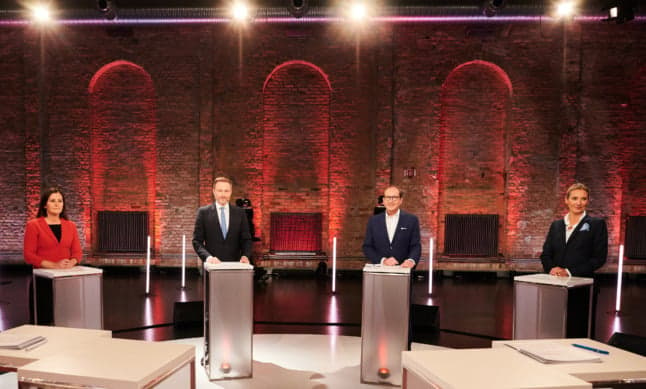
Candidates from the CSU, FDP, Left Party and AfD went head-to-head in a televised debate as volatile polls leave pundits wondering who the kingmakers could be in the next coalition. What does it all mean?
After the three Chancellor candidates battled it out live on television on Sunday, the electoral candidates of the four smaller parties - the Free Democratic Party, the Left, Alternative for Germany and the Christian Social Union - traded blows on key political issues on Monday night.
READ ALSO: Merkel’s candidate seeks to close gap in TV debate
Over the course of 90 minutes in ARD's "Four-way fight after the Triell" - candidates shared their views on foreign policy, social security, pensions and climate issues - and also gave their views on potential coalition partners after the election.
While all the major parties have ruled out governing with the anti-migrant Alternative for Germany (AfD), and the CSU is at home as the smaller Bavarian wing of the Union, the liberal Free Democrats and ex-DDR Left Party could both play an important role in determining the fate of German politics after the elections.
Speaking to the regional Rhein Zeitung on Tuesday, political scientist Karl-Rudolf Korte said that September's elections could have a "historic" outcome where numerous governments are possible.
"We will have an election evening with several chancellor possibilities - not just one," he said.
READ ALSO: Who will replace Angela Merkel as German chancellor?
That means that, after the election, the largest parties will scramble to form a majority government - and the FDP (who are currently polling at 11 percent) and Left Party (six percent) could be courted for their vote shares. A party needs to gain five percent of the second vote to enter the Bundestag.
A lot of talk/fear of the Left entering government. Less talk of how they only need to underperform by just a tad to not even enter the Bundestag.
(2017: 9.2%)#btw21 pic.twitter.com/dGkCDo2KLq
— William Noah Glucroft (@wnglucroft) September 14, 2021
Here's where each of the smaller parties stand on key issues - and who they can see themselves working with in the coming months.
Foreign Policy and Security
Cracks started to appear in the leftist dream of a Green-Red-Red coalition between the Greens, SPD and Left Party when it came to foreign policy. Whereas SPD chancellor candidate Olaf Sholz has demanded a clear commitment to Nato from any potential coalition party, Left Party co-leader Janine Wissler said she was deeply opposed to the military alliance.
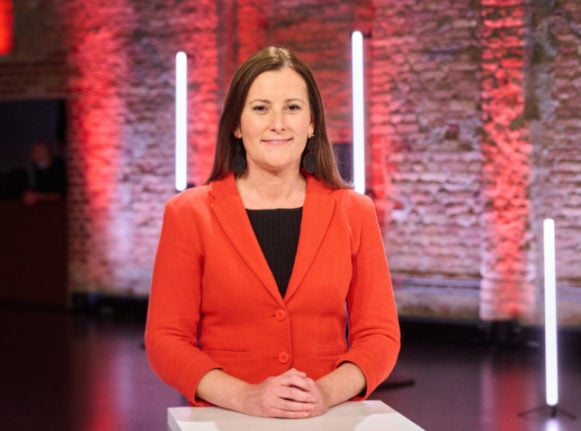
Janine Wissler (Left) is dedicated to the dissolution of Nato, which may cause issues when it comes to forming an alliance with Olaf Scholz' SPD. Photo: picture alliance/dpa | Annette Riedl
"We want to dissolve Nato and transfer it to a collective security alliance," Wissler said. The Left have previously called on the SPD and Greens to join forces with them after the September 26th elections, but this seemingly unbridgeable gap could well make it tricky for them to thrash out a coalition agreement.
However, when pressed by the moderators about whether foreign policy would get in the way of governing with the SPD, Wissler retorted that 'foreign policy' was about much more than just the military - it also includes issues such as development aid.
Pensions
On pension policy, FDP leader Christian Lindner called for greater flexibility on the retirement age and said that everyone, from the age of 60, should be able to choose when they retire. "We advocate individualisation," he said, adding that the FDP want a private equity model for pensions.
The AfD's Wiedel accused Lindner of having "no idea" about asset investment. She said the AfD wanted a sovereign wealth fund to secure pensions, but that it would have to include other forms of investment besides shares. "Otherwise you're vulnerable to the effects of a financial crash," she said.
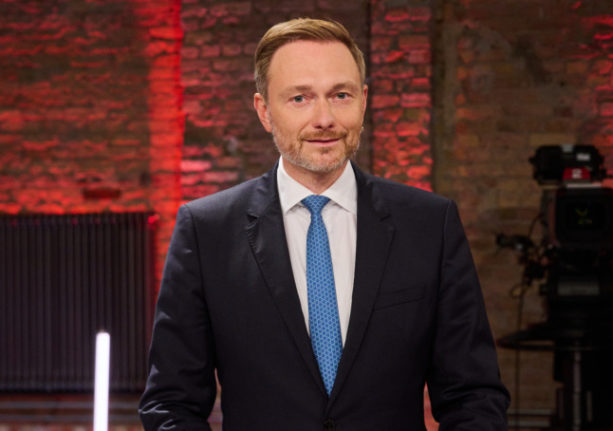
Christian Lindner (FDP) said he wants people to have more flexibility over when they retire. Photo: picture alliance/dpa | Annette Riedl
The CSU's top candidate Alexander Dobrindt, meanwhile, promoted his party's 'maternity pension', through which the state pays into the pension pot for three years to allow parents time to bring up their children. "The maternity pension is about justice and not about election campaigning," Dobrindt said.
He also called for a "generational pension" as a fourth pillar alongside the statutory pension, the company pension and private provision. This would be saved for from birth.
Taxation
On tax policy, Wissler defended the Left Party's proposal to introduce a "wealth tax" on real estate and other financial assets. Since everyone would be given a tax-free allowance of €1 million per person, many homeowners, especially families, would not be affected at all, she said. For business assets, this allowance would be increased to €5 million.
Weidel objected that the wealth tax would strike a "death blow" to businesses already struggling due to the Covid pandemic. "Their problems won't be solved by more redistribution," she added.
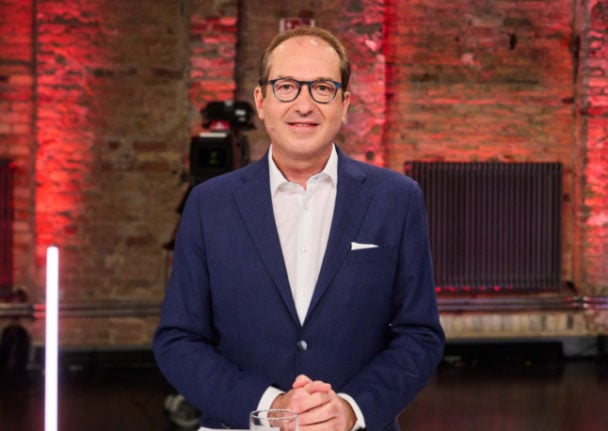
Alexander Dobrindt (CSU) wants to create "economic momentum" after the pandemic with lower taxes. Photo: picture alliance/dpa | Annette Riedl
Meanwhile, the CSU's Dobrindt stressed that his party wanted to "generate economic momentum" in the wake of the Covid crisis by avoiding higher taxes. Lindner spoke out in favour of measures to incentivise more private investment, saying that this would help Germany find its way out of the Covid crisis.
Climate
The small parties also clashed over approaches to climate change, with the Left pushing for an end to Germany's love affair with cars.
"It will never be efficient for one and a half tonnes of sheet metal to transport 70 kilos of people," Wissler explained. Instead, infrastructure could play a key role in the fight against climate change, she said, with the expansion of local public transport and the reactivation of disused railway lines in the countryside playing an important role in encouraging people to forego their cars.
READ ALSO: German public transport slammed as ‘failure’ as half of users switch to car
The CSU's Dobrindt accused the Left of wanting to punish drivers, and called for climate-neutral vehicles instead of anti-car policies. "It's not only if you vote Green that you can throw your car key into the ballot box," he said. "Also if you vote Left."
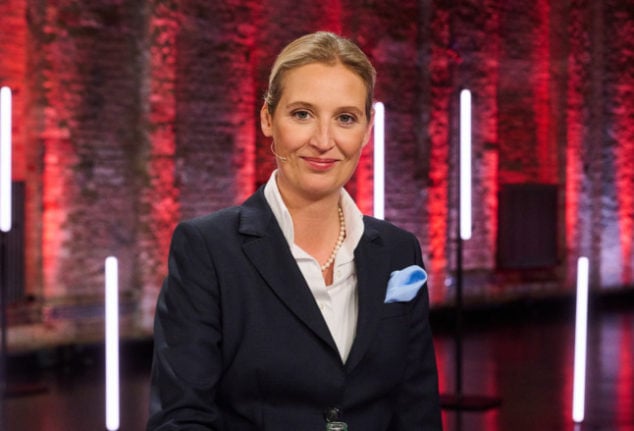
Like the rest of her party, Alice Wiedel (AfD) doesn't believe in man-made climate change. Photo: picture alliance/dpa | Annette Riedl
The FDP's Lindner, meanwhile, repeatedly pointed out that the fight against climate change was a global task, and called for Germany to lead the world in climate-friendly technology. Attacking Wissler's views on climate change, he asked her: "Have you become a natural scientist now?"
"If you're one, that's news to me," she hit back.
For AfD candidate Weidel, the fight to limit global warming to under 1.5C and switch to renewable energy is "laughable". The AfD does not believe in man-made climate change.
Coalitions
The final question of the evening may well have been the most pertinent one: what potential coalitions could the various small parties see themselves being part of?
If the mathematics work out for a Green-Red-Red coalition with the Greens, SPD and Left, "then we should talk very earnestly about how we can shape a change in policy," Wissler said. Nevertheless, it remains to be seen whether such an alliance could survive - especially when it comes to working with the SPD.
READ ALSO: ‘Potsdam is a mirror of Germany’: Chancellor candidates go head to head in local battle
Another possibility is a coalition between the SPD, Greens and the FDP, but once again, the liberals' Lindner was reticent about the issue. "We're seeing the SPD and Greens flirt with the Left," he said, adding that the FDP's responsibility was to push things towards the centre ground.
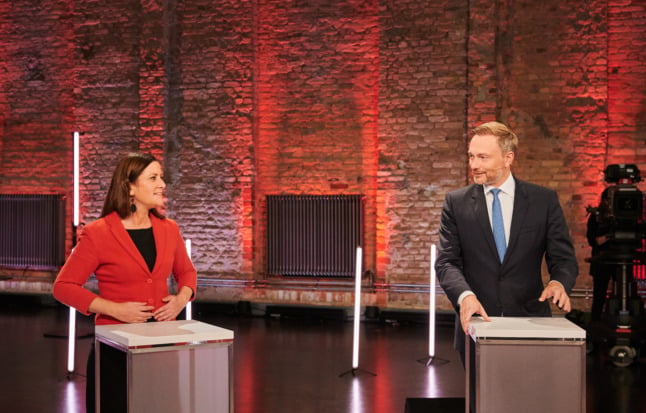
Who will be the kingmakers - the liberals or the leftists? Photo: picture alliance/dpa | Annette Riedl
After being pressed by the moderator, he distanced himself further from a potential 'Traffic Light' coalition. "We're not here to support a leftward shift in German politics," he said.
That was good news to the CSU's Dobrindt, who said he could see the Union working with the SPD and FDP after the election - particularly because this would allow them to avoid working with the Greens. The condition would be that the Union were allowed to lead the coalition - which could be a potential sticking point, considering the SPD look set to come out as the largest party, according to current polls.
READ ALSO: German election 2021: Merkel backs Laschet as CDU lags behind in polls
Since nobody is prepared to work with the AfD, Wiedel was something of an outsider in this discussion, but nevertheless, the party could informally prop up a new government by voting with them on some key issues.
Asked whether she could see herself voting with Armin Laschet's CDU, however, AfD candidate Wiedel paused for a second, before giving an unambiguous "No."
All of which means, the political landscape after the election is going to be far from easy to navigate. And it will likely be up to the two largest parties - the SPD and CDU - to decide how far they're willing to compromise in order to govern the country.
Comments
See Also
After the three Chancellor candidates battled it out live on television on Sunday, the electoral candidates of the four smaller parties - the Free Democratic Party, the Left, Alternative for Germany and the Christian Social Union - traded blows on key political issues on Monday night.
READ ALSO: Merkel’s candidate seeks to close gap in TV debate
Over the course of 90 minutes in ARD's "Four-way fight after the Triell" - candidates shared their views on foreign policy, social security, pensions and climate issues - and also gave their views on potential coalition partners after the election.
While all the major parties have ruled out governing with the anti-migrant Alternative for Germany (AfD), and the CSU is at home as the smaller Bavarian wing of the Union, the liberal Free Democrats and ex-DDR Left Party could both play an important role in determining the fate of German politics after the elections.
Speaking to the regional Rhein Zeitung on Tuesday, political scientist Karl-Rudolf Korte said that September's elections could have a "historic" outcome where numerous governments are possible.
"We will have an election evening with several chancellor possibilities - not just one," he said.
READ ALSO: Who will replace Angela Merkel as German chancellor?
That means that, after the election, the largest parties will scramble to form a majority government - and the FDP (who are currently polling at 11 percent) and Left Party (six percent) could be courted for their vote shares. A party needs to gain five percent of the second vote to enter the Bundestag.
A lot of talk/fear of the Left entering government. Less talk of how they only need to underperform by just a tad to not even enter the Bundestag.
— William Noah Glucroft (@wnglucroft) September 14, 2021
(2017: 9.2%)#btw21 pic.twitter.com/dGkCDo2KLq
Here's where each of the smaller parties stand on key issues - and who they can see themselves working with in the coming months.
Foreign Policy and Security
Cracks started to appear in the leftist dream of a Green-Red-Red coalition between the Greens, SPD and Left Party when it came to foreign policy. Whereas SPD chancellor candidate Olaf Sholz has demanded a clear commitment to Nato from any potential coalition party, Left Party co-leader Janine Wissler said she was deeply opposed to the military alliance.

Janine Wissler (Left) is dedicated to the dissolution of Nato, which may cause issues when it comes to forming an alliance with Olaf Scholz' SPD. Photo: picture alliance/dpa | Annette Riedl
"We want to dissolve Nato and transfer it to a collective security alliance," Wissler said. The Left have previously called on the SPD and Greens to join forces with them after the September 26th elections, but this seemingly unbridgeable gap could well make it tricky for them to thrash out a coalition agreement.
However, when pressed by the moderators about whether foreign policy would get in the way of governing with the SPD, Wissler retorted that 'foreign policy' was about much more than just the military - it also includes issues such as development aid.
Pensions
On pension policy, FDP leader Christian Lindner called for greater flexibility on the retirement age and said that everyone, from the age of 60, should be able to choose when they retire. "We advocate individualisation," he said, adding that the FDP want a private equity model for pensions.
The AfD's Wiedel accused Lindner of having "no idea" about asset investment. She said the AfD wanted a sovereign wealth fund to secure pensions, but that it would have to include other forms of investment besides shares. "Otherwise you're vulnerable to the effects of a financial crash," she said.

Christian Lindner (FDP) said he wants people to have more flexibility over when they retire. Photo: picture alliance/dpa | Annette Riedl
The CSU's top candidate Alexander Dobrindt, meanwhile, promoted his party's 'maternity pension', through which the state pays into the pension pot for three years to allow parents time to bring up their children. "The maternity pension is about justice and not about election campaigning," Dobrindt said.
He also called for a "generational pension" as a fourth pillar alongside the statutory pension, the company pension and private provision. This would be saved for from birth.
Taxation
On tax policy, Wissler defended the Left Party's proposal to introduce a "wealth tax" on real estate and other financial assets. Since everyone would be given a tax-free allowance of €1 million per person, many homeowners, especially families, would not be affected at all, she said. For business assets, this allowance would be increased to €5 million.
Weidel objected that the wealth tax would strike a "death blow" to businesses already struggling due to the Covid pandemic. "Their problems won't be solved by more redistribution," she added.

Alexander Dobrindt (CSU) wants to create "economic momentum" after the pandemic with lower taxes. Photo: picture alliance/dpa | Annette Riedl
Meanwhile, the CSU's Dobrindt stressed that his party wanted to "generate economic momentum" in the wake of the Covid crisis by avoiding higher taxes. Lindner spoke out in favour of measures to incentivise more private investment, saying that this would help Germany find its way out of the Covid crisis.
Climate
The small parties also clashed over approaches to climate change, with the Left pushing for an end to Germany's love affair with cars.
"It will never be efficient for one and a half tonnes of sheet metal to transport 70 kilos of people," Wissler explained. Instead, infrastructure could play a key role in the fight against climate change, she said, with the expansion of local public transport and the reactivation of disused railway lines in the countryside playing an important role in encouraging people to forego their cars.
READ ALSO: German public transport slammed as ‘failure’ as half of users switch to car
The CSU's Dobrindt accused the Left of wanting to punish drivers, and called for climate-neutral vehicles instead of anti-car policies. "It's not only if you vote Green that you can throw your car key into the ballot box," he said. "Also if you vote Left."

Like the rest of her party, Alice Wiedel (AfD) doesn't believe in man-made climate change. Photo: picture alliance/dpa | Annette Riedl
The FDP's Lindner, meanwhile, repeatedly pointed out that the fight against climate change was a global task, and called for Germany to lead the world in climate-friendly technology. Attacking Wissler's views on climate change, he asked her: "Have you become a natural scientist now?"
"If you're one, that's news to me," she hit back.
For AfD candidate Weidel, the fight to limit global warming to under 1.5C and switch to renewable energy is "laughable". The AfD does not believe in man-made climate change.
Coalitions
The final question of the evening may well have been the most pertinent one: what potential coalitions could the various small parties see themselves being part of?
If the mathematics work out for a Green-Red-Red coalition with the Greens, SPD and Left, "then we should talk very earnestly about how we can shape a change in policy," Wissler said. Nevertheless, it remains to be seen whether such an alliance could survive - especially when it comes to working with the SPD.
READ ALSO: ‘Potsdam is a mirror of Germany’: Chancellor candidates go head to head in local battle
Another possibility is a coalition between the SPD, Greens and the FDP, but once again, the liberals' Lindner was reticent about the issue. "We're seeing the SPD and Greens flirt with the Left," he said, adding that the FDP's responsibility was to push things towards the centre ground.

Who will be the kingmakers - the liberals or the leftists? Photo: picture alliance/dpa | Annette Riedl
After being pressed by the moderator, he distanced himself further from a potential 'Traffic Light' coalition. "We're not here to support a leftward shift in German politics," he said.
That was good news to the CSU's Dobrindt, who said he could see the Union working with the SPD and FDP after the election - particularly because this would allow them to avoid working with the Greens. The condition would be that the Union were allowed to lead the coalition - which could be a potential sticking point, considering the SPD look set to come out as the largest party, according to current polls.
READ ALSO: German election 2021: Merkel backs Laschet as CDU lags behind in polls
Since nobody is prepared to work with the AfD, Wiedel was something of an outsider in this discussion, but nevertheless, the party could informally prop up a new government by voting with them on some key issues.
Asked whether she could see herself voting with Armin Laschet's CDU, however, AfD candidate Wiedel paused for a second, before giving an unambiguous "No."
All of which means, the political landscape after the election is going to be far from easy to navigate. And it will likely be up to the two largest parties - the SPD and CDU - to decide how far they're willing to compromise in order to govern the country.
Join the conversation in our comments section below. Share your own views and experience and if you have a question or suggestion for our journalists then email us at [email protected].
Please keep comments civil, constructive and on topic – and make sure to read our terms of use before getting involved.
Please log in here to leave a comment.